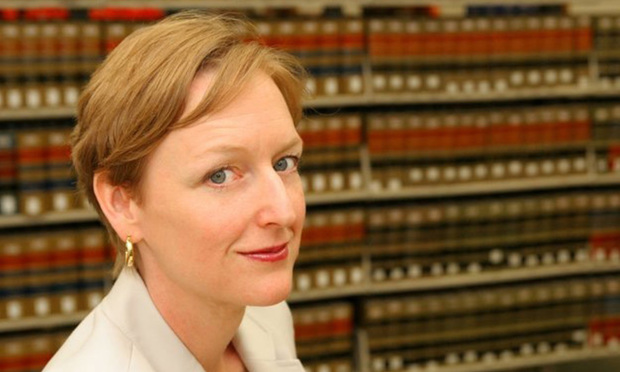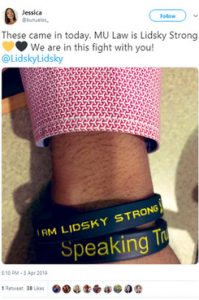Law Dean Takes Her Breast Cancer Fight to Twitter
Faculty at University of Missouri School of Law have rallied around Lyrissa Lidsky, who has chosen to be transparent about her treatment and has documented much of the process through her popular Twitter feed.
April 11, 2019 at 01:55 PM
6 minute read
 Lyrissa Lidsky.
Lyrissa Lidsky.
The bracelets arrived at the perfect time.
The first week of April was a low point in University of Missouri School of Law Dean Lyrissa Lidsky's four-month-old battle with breast cancer. She'd recently wrapped up her fourth round of chemotherapy and a bout of bronchitis had exiled her to her home for a week of recovery—doctor's orders. Being away from the campus and job she loves was difficult, she said.
Then her husband arrived home with a handful of rubber bracelets for Lidsky and the couples' three sons, emblazoned with the words: “I Am Lidsky Strong.” Her law school colleagues had ordered the bracelets, which were distributed to faculty, students and staff. Even staff from the university provost and chancellor's offices picked up bracelets, as did some undergraduates. It was a much-needed pick-me-up for Lidsky.
“My colleagues thought they wanted a tangible sign of support,” Lidsky said in an interview this week, having kicked the bronchitis and returned to work. “It really brightened my day and made me feel good.”
Lidsky credits the unwavering support of her family, her faculty and her students with helping her stay optimistic about her health and manage her treatment while also running the law school—a balancing act she knows of only one other law dean taking on.
And unlike that other dean, who did not publicly disclose the diagnosis, Lidsky has chosen to be transparent about her treatment. She has documented much of the process through her popular Twitter feed, which has more than 3,000 followers. (Alongside law school news and commentary on First Amendment issues, of which she is an expert, Lidsky has told Twitter followers when she was too tired to attend events, documented her inability to apply false eyelashes, and offered advice on undergoing chemotherapy.)
 Twitter post supporting Missouri Law Dean Lyrissa Lidsky.
Twitter post supporting Missouri Law Dean Lyrissa Lidsky. Lidsky said this week that she felt the need to be up-front about her diagnosis and treatment as the public face of the law school. Her bald head is an obvious giveaway that she has cancer, and she wants the law school community to understand that her prognosis is good, with a likely chance of full recovery. Moreover, she leans toward transparency in general.
“It's kind of within my personality, she said. “I'm a fairly open person. But when you are dean of a law school, you are in a very public position. You travel a lot. You meet lots of people. You are the outward symbol of your institution. It just was far easier to be open. I don't want people to be more afraid than they need to be because they see that I'm bald and know I must be going through cancer.”
Lidsky arrived at Missouri in 2017 from the University of Florida Levin College of Law, where she was associate dean of graduate and non-J.D. programs. She quickly grew to love Missouri, which she said has one of the “most functional” law faculties in the country. But she was knocked back on her heels in December when she discovered a lump in her breast during a self-exam.
The doctors diagnosed her with a strain of cancer that used to be difficult to treat but is now very manageable with a new type of drug. Moreover, Lidsky caught the cancer in an early stage and her doctors believe she will make a full recovery. Once she wraps up chemotherapy next month, she will have a lumpectomy followed by radiation, then a year of drug treatment to ensure the cancer doesn't come back. In all, her treatment will last about 18 months.
The early results are positive. Her tumor was undetectable by sonogram following her second round of chemotherapy. (She's enrolled in a medical trial in which doctors monitor the tumor after each chemo round.)
But Lidksy said cancer has been a learning experience: learning to allow others to help; learning to say no to events and obligations she can't take on; learning to prioritize; and learning to work smarter, not harder.
She has dialed back some of her dean duties, although she is still teaching a First Amendment class this semester. (She calls the classroom her sanctuary.) She is doing far less air travel in order to protect her immune system. Instead, she has prioritized meeting with alumni within Missouri and communicating with those outside the state through other avenues. She attends fewer evening events because she often doesn't have the energy at the end of the day. And her faculty and administrators have stepped up and taken some responsibilities off her plate, even though it has been difficult to let go of some of those tasks, Lidsky said.
Missouri Law professor Ben Trachtenberg said Lidsky's ability to manage the school and cancer has been inspirational.
“I appreciate how she has kept us informed about what she can and cannot do,” he said in an email. “It turns out that even with her cancer treatments, there's not much she can't do. But when she can't be in the building, like when she has a chemo appointment, she tells us who to contact about what so nothing slips through the cracks.”
A law dean needs to project optimism about their institution, according to Lidsky, and that outlook has carried over into her cancer treatment—in turn helping her manage through the most difficult days of chemotherapy.
“It sounds strange to say, but there is a gift in a cancer diagnosis,” Lidsky said. “Since my diagnoses, people have just been incredibly warm, and thoughtful, kind and generous. I have been overwhelmed by how thoughtful people have been. I'm used to always being the caretaker for other people. It's not natural for me to accept help. I've had to learn to accept help and learn that people really do want to help you. I've really seen the best of human nature since was diagnosed.”
This content has been archived. It is available through our partners, LexisNexis® and Bloomberg Law.
To view this content, please continue to their sites.
Not a Lexis Subscriber?
Subscribe Now
Not a Bloomberg Law Subscriber?
Subscribe Now
NOT FOR REPRINT
© 2025 ALM Global, LLC, All Rights Reserved. Request academic re-use from www.copyright.com. All other uses, submit a request to [email protected]. For more information visit Asset & Logo Licensing.
You Might Like
View All
Statute of Limitations Shrivels $5M Jury Award to Less than $1M, 8th Circuit Rules
4 minute read
Read the Document: DOJ Releases Ex-Special Counsel's Report Explaining Trump Prosecutions
3 minute read
Arizona Board Gives Thumbs Up to KPMG's Bid To Deliver Legal Services

Goodwin to Launch Brussels Office With Quinn Emanuel Antitrust Partner
3 minute readTrending Stories
- 1Family Court 2024 Roundup: Part I
- 2In-House Lawyers Are Focused on Employment and Cybersecurity Disputes, But Looking Out for Conflict Over AI
- 3A Simple 'Trial Lawyer' Goes to the Supreme Court
- 4Clifford Chance Adds Skadden Rainmaker in London
- 5Latham, Kirkland and Paul Weiss Climb UK M&A Rankings
Who Got The Work
J. Brugh Lower of Gibbons has entered an appearance for industrial equipment supplier Devco Corporation in a pending trademark infringement lawsuit. The suit, accusing the defendant of selling knock-off Graco products, was filed Dec. 18 in New Jersey District Court by Rivkin Radler on behalf of Graco Inc. and Graco Minnesota. The case, assigned to U.S. District Judge Zahid N. Quraishi, is 3:24-cv-11294, Graco Inc. et al v. Devco Corporation.
Who Got The Work
Rebecca Maller-Stein and Kent A. Yalowitz of Arnold & Porter Kaye Scholer have entered their appearances for Hanaco Venture Capital and its executives, Lior Prosor and David Frankel, in a pending securities lawsuit. The action, filed on Dec. 24 in New York Southern District Court by Zell, Aron & Co. on behalf of Goldeneye Advisors, accuses the defendants of negligently and fraudulently managing the plaintiff's $1 million investment. The case, assigned to U.S. District Judge Vernon S. Broderick, is 1:24-cv-09918, Goldeneye Advisors, LLC v. Hanaco Venture Capital, Ltd. et al.
Who Got The Work
Attorneys from A&O Shearman has stepped in as defense counsel for Toronto-Dominion Bank and other defendants in a pending securities class action. The suit, filed Dec. 11 in New York Southern District Court by Bleichmar Fonti & Auld, accuses the defendants of concealing the bank's 'pervasive' deficiencies in regards to its compliance with the Bank Secrecy Act and the quality of its anti-money laundering controls. The case, assigned to U.S. District Judge Arun Subramanian, is 1:24-cv-09445, Gonzalez v. The Toronto-Dominion Bank et al.
Who Got The Work
Crown Castle International, a Pennsylvania company providing shared communications infrastructure, has turned to Luke D. Wolf of Gordon Rees Scully Mansukhani to fend off a pending breach-of-contract lawsuit. The court action, filed Nov. 25 in Michigan Eastern District Court by Hooper Hathaway PC on behalf of The Town Residences LLC, accuses Crown Castle of failing to transfer approximately $30,000 in utility payments from T-Mobile in breach of a roof-top lease and assignment agreement. The case, assigned to U.S. District Judge Susan K. Declercq, is 2:24-cv-13131, The Town Residences LLC v. T-Mobile US, Inc. et al.
Who Got The Work
Wilfred P. Coronato and Daniel M. Schwartz of McCarter & English have stepped in as defense counsel to Electrolux Home Products Inc. in a pending product liability lawsuit. The court action, filed Nov. 26 in New York Eastern District Court by Poulos Lopiccolo PC and Nagel Rice LLP on behalf of David Stern, alleges that the defendant's refrigerators’ drawers and shelving repeatedly break and fall apart within months after purchase. The case, assigned to U.S. District Judge Joan M. Azrack, is 2:24-cv-08204, Stern v. Electrolux Home Products, Inc.
Featured Firms
Law Offices of Gary Martin Hays & Associates, P.C.
(470) 294-1674
Law Offices of Mark E. Salomone
(857) 444-6468
Smith & Hassler
(713) 739-1250








